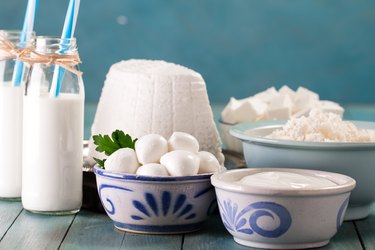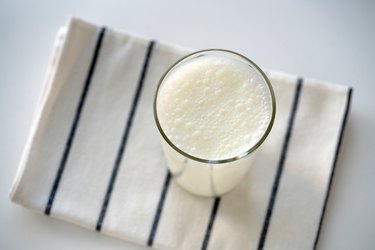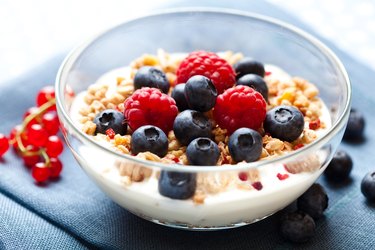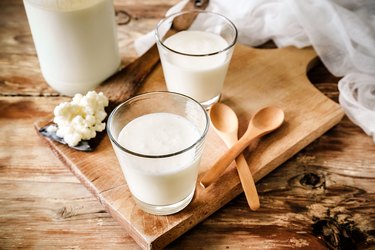
Long before probiotics took the wellness industry by storm, people have been fermenting milk products on their own. This process, also known as culturing, kept the dairy safe before refrigeration because of its high acidity, according to a December 2017 article in the Journal of Dairy Science.
It turns out, however, that there are also health benefits to eating and drinking fermented milk products. And you can chalk these perks up to the beneficial microorganisms that call these dairy foods home.
Video of the Day
Video of the Day
Case in point: Cultured dairy products like yogurt are tied to improved GI health, per a November 2018 review in Nutrition Reviews. Research suggests yogurt may even bolster immune and anti-inflammatory responses in the body.
Reap the potential benefits by adding these fermented milk foods to your grocery list — so long as you're not lactose intolerant!
1. Buttermilk

Although the term "buttermilk" can be used to describe the liquid that remains after milk or cream is turned into butter, it usually refers to thick, sour-tasting milk that's made with active cultures.
These cultures form lactic acid, which not only creates the sour taste but also benefits a number of baked goods. When the lactic acid reacts with a leavening agent, such as baking soda, the combination starts fizzing up, according to Dairy Good. This lends baked goods a light, airy texture.
Drinking buttermilk could have a beneficial effect on blood pressure, according to a small January 2014 study published in the journal Nutrition. Researchers note that buttermilk contains milk fat globule membranes that possess unique bioactive proteins, and participants who drank buttermilk were observed to have reduced systolic blood pressure and arterial blood pressure.
2. Yogurt

Yogurt may be the best-known fermented dairy product, thanks to its creamy, rich taste and snackable convenience.
Yogurt is made by culturing milk with the lactic acid-forming bacteria Lactobacillus bulgaricus and Streptococcus thermophilus, per California Dairy Research, and sometimes additional bacterial strains of Lactobacillus and Bifidobacterium are added for extra health benefits. These strains of bacteria help to maintain a healthy digestive system, according to the Academy of Nutrition and Dietetics.
For the most part, all yogurts contain live cultures and therefore act as probiotics. However, if the yogurt has been heat-treated after fermentation, the live cultures are killed off and can't impart any health benefits, per California Dairy Research. So when you're shopping for yogurt, make sure the one you choose notes that it contains "live and active cultures."
Tip
Although all yogurt contains sugar in the form of lactose, which is naturally occurring in milk products, you can avoid added sugar by opting for plain yogurt instead of flavored.
3. Kefir

Originating in Eastern Europe, kefir is much like yogurt but is typically drank instead of eaten with a spoon. It's also a fermented dairy product that has live, active cultures that can help with digestion, according to the Mayo Clinic. Like yogurt, it also contains protein, calcium and B vitamins.
A review of studies published in May 2016 in Frontiers in Microbiology looked at a number of purported health benefits of kefir: Researchers noted that kefir has cholesterol-lowering properties, though many of the studies reviewed were done on animals. The review also determined that kefir can alter the gut microbiota in a positive way and has a number of antibacterial and antifungal properties.
What's more, researchers note that kefir has significant antitumor activities against multiple types of cancer cells. However, more studies should be done on the health benefits of kefir to really solidify these benefits.
Read more: 5 Probiotic-Rich Recipes Your Gut Will Love
4. Sour Cream

Often considered a bit of an indulgence, sour cream is made by "souring" pasteurized cream with lactic acid-producing bacteria. Fun fact: Sour cream must contain at least 18 percent milkfat to be technically considered sour cream, according to the Food and Drug Administration (FDA). The high fat content is why people frequently nix it from their grocery lists when they're trying to cut calories and lose weight.
Because sour cream has the same lactic acid-producing bacteria as other fermented dairy products, it can boast some of the same health benefits. However, it's high in fat and calories; just one tablespoon contains nearly 24 calories and more than 2 grams of fat, according to the USDA, so you might want to enjoy it sparingly.
5. Cheese

Because not all types of cheese are fermented, look for live active cultures on the label to determine whether they contain probiotics. Both soft-fresh cheese and aged cheeses can be fermented; for example, fresh cheeses such as cottage cheese, cream cheese and ricotta are made by coagulating milk with lactic acid, according to Think USA Dairy.
Full-fat cheese is higher in saturated fat, but eating small amounts of minimally processed cheese can definitely be part of a healthy diet. And if you're concerned about the saturated fat content, know that you can choose a low-fat cheese to reap the benefits.
- Mayo Clinic: "Mayo Clinic Minute: What Is Kefir?"
- California Dairy Research: "Are All Yogurts ‘Probiotic Yogurts’?"
- Dairy Good: "What is Buttermilk and What is it Used For?"
- Nutrition: "Effect of Buttermilk Consumption on Blood Pressure in Moderately Hypercholesterolemic Men and Women"
- Academy of Nutrition and Dietetics: "What to Look for in Yogurt"
- Food and Drug Administration: "CFR - Code of Federal Regulations Title 21"
- USDA: "Cream, Sour, Cultured"
- Think USA Dairy: "Soft-Fresh Cheeses"
- Nutrition Reviews: "Yogurt and other fermented foods as sources of health-promoting bacteria"